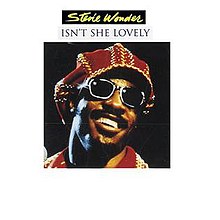Isn't She Lovely
| "Isn't She Lovely" | |
|---|---|
 Motown CD single reissue (1996) | |
| Promotional single by Stevie Wonder | |
| from the album Songs in the Key of Life | |
| Released | 1976 |
| Recorded | 1975 |
| Genre | Soul |
| Length | 6:33 |
| Label | Tamla |
| Songwriter(s) | Stevie Wonder |
| Producer(s) | Stevie Wonder |
| Alternative cover | |
| File:Isn't She Lovely 45.jpg Tamla promotional single (1976) | |
"Isn't She Lovely" is a song by Stevie Wonder from his 1976 album, Songs in the Key of Life. The lyrics celebrate the birth of his daughter, Aisha Morris. Wonder collaborated on the song with Harlem songwriter and studio owner Burnetta "Bunny" Jones.[1]
The song opens side 3 of Songs in the Key of Life, and starts with a baby's first cry recorded during an actual childbirth. A recording of Wonder bathing Aisha as an older toddler is brought into the final section of the song, mixed with Wonder's extended chromatic harmonica solo. All of the instruments heard in the song are played by Wonder, except for Greg Phillinganes on some of the keyboard parts. During the recording process, bassist Nathan Watts laid down a bass guitar line to serve as a guide track for Wonder, but Wonder eventually replaced this with his own keyboard bass performance.[2]
The more-than-six-minute song was not released as a single, as Wonder was unwilling to shorten the song to fit the 7", 45 rpm format.[2] With consumers demanding a single, Tamla compromised in late 1976, and a promotional version was given to radio stations. This edited version, 3:12 in length, received so much airplay that it reached number 23 on the Adult Contemporary chart in January 1977. Since then, the song has become a jazz and pop standard, covered by many artists.[3]
Wonder performed the song live for Queen Elizabeth II at her Diamond Jubilee Concert on June 4, 2012, with lyrics modified to refer to the Queen.[4]
Releases
Tamla released two different versions of the song – the longer album version opens with the sound of a baby crying, and the outro features Aisha as a baby; a promotional single edited for radio leaves out the crying baby sounds at the beginning and has a much shorter outro.
The song was not issued as a commercial single and therefore it did not appear on the major charts in the US and UK. However, due to radio airplay, it reached number 23 on the Billboard Adult Contemporary chart on January 29, 1977.[5]
Personnel
- Stevie Wonder – vocals, harmonica, percussion, RMI Electra Piano, Fender Rhodes, bass synth, drums
- Greg Phillinganes – keyboards
- Aisha Morris - crying
Notable cover versions
- Vocalist David Parton released the song, which was a UK number 4 hit, in mid-January 1977. It spent nine weeks on the chart.[6] It was the 54th biggest hit of the year.[7] Parton's version gave him one-hit wonder status in the UK.[2]
- Jazz guitarist Lee Ritenour included the song on his 1977 instrumental album Captain Fingers.[3]
- Pianist/percussionist Victor Feldman recorded a jazz instrumental version for his 1977 album The Artful Dodger.[3] Feldman also played congas on Ritenour's version released the same year.
- Clarinetist and bandleader Woody Herman fronted a big band version in 1978 on the album Fatha Herman and his Thundering Herd.[3]
- Saxophonist/arranger Bill Holman included the song on his 1987 album The Bill Holman Band.[3]
- In November 2012, an acoustic version sung by cancer victim Jimmy Higham and his friend and colleague John Walmsley reached number 41 on the UK Singles Chart, surpassing the likes of Taylor Swift and Rihanna.[8] The song was released and proceeds of its electronic sales went to raise money for a bursary fund set up in Higham's memory at Wellington College, Berkshire, where he had worked as a member of staff. As a result, Wonder's original version entered the UK Singles Chart and peaked at number 94.[9]
Chart history
| Year | Artist | IR | SA | UK | U.S. Billboard | |
|---|---|---|---|---|---|---|
| IRMA | Springbok | Singles Chart | U.S. Hot 100 | U.S. AC | ||
| 1976 | Stevie Wonder | |||||
| 1977 | David Parton | |||||
| 1977 | Leslie Kleinsmith | |||||
| 2012 | Jimmy Higham & Jon Walmsley | |||||
References
- ^ Terry Barnes (December 1998). "Passings". Billboard. Vol. 110, no. 52. p. 68. ISSN 0006-2510.
- ^ a b c Zeth Lundy (2007). Stevie Wonder's Songs in the Key of Life. Bloomsbury. p. 31. ISBN 9781441170125.
- ^ a b c d e James E. Perone (2006). The Sound of Stevie Wonder: His Words and Music. Praeger. p. 122. ISBN 9780313051081.
- ^ "Sir Paul McCartney, Stevie Wonder, Sir Elton John and Madness Lead Queen's Diamond Jubilee". WCBS-FM. June 5, 2012. Retrieved July 21, 2013.
- ^ a b Whitburn, Joel. Top Adult Songs 1961–2006.
- ^ a b c Roberts, David (2006). British Hit Singles & Albums (19th ed.). London: Guinness World Records Limited. p. 419. ISBN 1-904994-10-5.
- ^ "Top 100 1977 - UK Music Charts". Uk-charts.top-source.info. Retrieved 2016-08-19.
- ^ a b "Jimmy Higham & Jon Walmsley". The Official Charts Company.
- ^ a b "The Official Charts Company - Isn't She Lovely". The Official Charts Company. 6 May 2013. Archived from the original on 12 February 2012.
